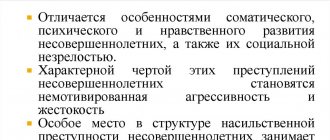What is non-payment of child support?
Non-payment of alimony - liability for this crime is provided for in Article 157 of the Criminal Code of the Russian Federation. In the article I will talk about methods of defense against this accusation in the investigation. Let's first understand the meaning of Article 157 of the Criminal Code of the Russian Federation - “on non-payment of alimony”, when it is applicable and what punishment the legislator has provided for its violation.
1. Failure by a parent to pay, without good reason, in violation of a court decision or a notarized agreement, funds for the maintenance of minor children, as well as disabled children who have reached the age of eighteen, if this act is committed repeatedly, is punishable by correctional labor for up to one year, or forced labor for up to one year. the same term, or arrest for a term of up to three months, or imprisonment for a term of up to one year. 2. Failure by adult able-bodied children to pay without good reason, in violation of a court decision or a notarized agreement, funds for the maintenance of disabled parents, if this act is committed repeatedly, is punishable by correctional labor for up to one year, or forced labor for the same period, or arrest for for a term of up to three months, or imprisonment for a term of up to one year.
Art. 157 of the Criminal Code of the Russian Federation, paragraphs 1 and 2
From these two points it follows that both parents who are obliged to pay alimony in favor of their minor or disabled children, and children who by force of law are also obliged to support their disabled parents can be involved.
This obligation could arise either by a court decision or by agreement of the parties. Moreover, the legislator clearly stated that an agreement on alimony must be notarized in order to initiate a criminal case and bring a person under the first or second part of Article 157 of the Criminal Code of the Russian Federation. Further to this article there are two notes, one regarding children, the other about parents?
Notes. 1. Failure by a parent to pay, without good reason, in violation of a court decision or a notarized agreement, funds for the maintenance of minor children, as well as disabled children who have reached the age of eighteen, if this act is committed repeatedly, is recognized as a failure by a parent to pay without good reason, in violation of a court decision or a notarized agreement. funds for the maintenance of minor children, as well as disabled children who have reached the age of eighteen, subjected to administrative punishment for a similar act, during the period when the person is considered subject to administrative punishment. 2. Failure by adult able-bodied children to pay, without good reason, in violation of a court decision or a notarized agreement, funds for the maintenance of disabled parents, if this act is committed repeatedly, is recognized as failure by adult able-bodied children, without good reason, in violation of a court decision or a notarized agreement, to pay for the maintenance of disabled parents. subjected to administrative punishment for a similar act, during the period when the person is considered subject to administrative punishment.
Art. 157 of the Criminal Code of the Russian Federation
The concept of repetition is defined here; it boils down to the fact that if a person has already been subjected to an administrative penalty and the penalty has not been extinguished under Article 5.35.1. Code of Administrative Offenses of the Russian Federation, then the person may be brought to criminal liability.
Judicial practice under Article 157 of the Criminal Code of the Russian Federation
Appeal ruling of the Judicial Collegium for Criminal Cases of the Supreme Court of the Russian Federation dated 09/05/2018 N 82-APU18-6
September 29, 2022 under Part 1 of Art. 157 of the Criminal Code of the Russian Federation to 3 months of imprisonment, released on December 13, 2022 after serving the sentence, convicted under paragraph “c” of Part 2 of Art. 105 of the Criminal Code of the Russian Federation to 12 years in prison with restriction of freedom for 1 year 6 months,
Appeal ruling of the Judicial Collegium for Criminal Cases of the Supreme Court of the Russian Federation dated December 27, 2018 N 82-APU18-9
- 12/13/2013 under Part 1 of Art. 119 of the Criminal Code of the Russian Federation to 1 year of restriction of freedom; on the basis of Art. The Criminal Code of the Russian Federation partially added the unserved sentence under the sentence of October 14, 2013, according to which he was convicted under Part 1 of Art. 157 of the Criminal Code of the Russian Federation to 5 months of correctional labor, a final sentence of 1 year 1 month of restriction of freedom was imposed;
Appeal ruling of the Judicial Collegium for Criminal Cases of the Supreme Court of the Russian Federation dated January 24, 2019 in case No. 45-APU18-33
October 24, 2022 under Part 1 of Art. 157 of the Criminal Code of the Russian Federation to correctional labor for a period of 8 months with the withholding of 5% of earnings, the punishment has not been served, sentenced to imprisonment under clauses “a”, “c”, “d”, “g”, “h”, part 2 of Art. . 105 of the Criminal Code of the Russian Federation to 19 years with restriction of freedom for 1 year 6 months; according to paragraph “c” of Part 4 of Art. 162 of the Criminal Code of the Russian Federation by 9 years.
Determination of the Judicial Collegium for Criminal Cases of the Supreme Court of the Russian Federation dated February 27, 2019 N 18-UD19-6
- December 14, 2009 under Part 1 of Art. 157 of the Criminal Code of the Russian Federation to correctional labor for a period of 1 year with the withholding of 20% of earnings to the state, on November 22, 2010 the punishment was replaced by 3 months 11 days of imprisonment, the punishment was not served,
Appeal ruling of the Judicial Collegium for Criminal Cases of the Supreme Court of the Russian Federation dated 04.04.2019 N 19-APU19-4sp
Gizatullin Nadir Nagilevich, ... convicted: July 3, 2014 under Part 1 of Art. 157 of the Criminal Code of the Russian Federation to 8 months of correctional labor with a deduction of 10% to the state income with the replacement on February 5, 2015 of the unserved sentence by imprisonment for 2 months 16 days, released on May 26, 2015 upon completion of the sentence; February 24, 2016 under Part 1 of Art. 157 of the Criminal Code of the Russian Federation to 4 months of imprisonment, released on September 19, 2016 upon completion of the sentence,
Appeal ruling of the Judicial Collegium for Criminal Cases of the Supreme Court of the Russian Federation dated November 5, 2019 N 81-APU19-17
EVSIKOV Viktor Vladimirovich, ..., on May 4, 2022, convicted by the magistrate of judicial district N ... of the Rudnichny judicial district of Prokopyevsk, Kemerovo region, under Part 1 of Art. 157 of the Criminal Code of the Russian Federation to 6 months of correctional labor (the punishment has not been served),
Appeal ruling of the Judicial Collegium for Criminal Cases of the Supreme Court of the Russian Federation dated November 8, 2017 N 74-APU17-8
1) On March 26, 2014, by the verdict of the magistrate for judicial district No. ... of the Mountain District of the Republic of Sakha (Yakutia) under Part 1 of Art. 157 of the Criminal Code of the Russian Federation to 8 months of correctional labor with the withholding of 5% of wages to the state,
Cassation ruling of the Judicial Collegium for Criminal Cases of the Supreme Court of the Russian Federation dated November 14, 2017 N 20-UD17-14
December 24, 2013 under Part 1 of Art. 157 of the Criminal Code of the Russian Federation to 3 months 10 days of correctional labor with the withholding of 10% of earnings to the state, by a resolution of February 20, 2014, correctional labor was replaced by imprisonment for a period of 1 month 2 days, on the basis of Art. The Criminal Code of the Russian Federation decided to consider the punishment suspended with a probationary period of 6 months,
Appeal ruling of the Judicial Collegium for Criminal Cases of the Supreme Court of the Russian Federation dated November 30, 2017 N 32-APU17-19sp
Korsakova Elizaveta Viktorovna, ... convicted on October 15, 2010 under Part 1 of Art. 157 of the Criminal Code of the Russian Federation to a fine of 2,500 rubles, - convicted under: - clause “a”, part 2 of Art. 126 of the Criminal Code of the Russian Federation for 8 years in prison;
Appeal ruling of the Judicial Collegium for Criminal Cases of the Supreme Court of the Russian Federation dated December 26, 2017 N 5-APU17-124
law enforcement agencies of the Republic of Belarus Karavaev A.A. accused of committing a crime under Part 3 of Art. 157 of the Criminal Code of the Republic of Belarus (infecting another person with HIV through frivolity or with indirect intent by a person who knew that he had this disease, in relation to three victims).
Appeal ruling of the Judicial Collegium for Criminal Cases of the Supreme Court of the Russian Federation dated February 13, 2018 N 58-APU18-2
- May 28, 2013 under Part 1 of Art. 157 of the Criminal Code of the Russian Federation to correctional labor for a period of 8 months with the withholding of 5% of wages to the state income, Art. Criminal Code of the Russian Federation - conditionally with a probationary period of 1 year 6 months; by a court ruling dated January 30, 2014, the suspended sentence was revoked; by a ruling dated July 11, 2016, the unserved sentence in the form of correctional labor was replaced by imprisonment for a period of 22 days, convicted
Sometimes they are released from liability
At the beginning of 2022, the Plenum of the Supreme Court added to the list of reasons why a debtor can be released from liability for failure to pay alimony:
- Circumstances beyond the control of the defaulter. For example, if he became incapacitated, the employer stopped paying wages, and he was called up for compulsory military service.
- Serving a sentence for another crime, if he was not involved in labor and there was no such opportunity.
The RF Supreme Court emphasized that disagreement with the amount of alimony is not a basis for non-payment. If they do not suit the debtor, he can file a claim in court to have the amount of payments revised. The same applies to living together with the recipient of alimony - this does not exempt from alimony obligations; they can be punished under the Criminal Code of the Russian Federation.
Who is a persistent alimony defaulter?
Malicious evasion of alimony payment is a deliberate long-term (more than 4 months) non-payment of funds assigned by a court decision, arising as a result of the deliberate actions of the debtor and solely through his fault.
Malicious evasion of alimony payment applies to debtors in the event of failure to comply with legal requirements for maintenance:
- minor children;
- adult disabled children;
- disabled parents.
If signs of malice , the following officials can, in close cooperation, bring the guilty person to the highest (criminal) level of responsibility for debts incurred and concealment of income:
- bailiff responsible for specific enforcement proceedings;
- investigator of the Office of the Federal Bailiff Service (UFSSP);
- head of the territorial department of the Federal Bailiff Service (senior bailiff).
Also, the collecting party has the right to initiate criminal prosecution for failure to pay funds for the maintenance of children or disabled parents by filing a corresponding petition with the territorial body of the Federal Bailiff Service.
If a notarial agreement on the payment of alimony was concluded between the parties, and the father (or mother) of the child ceased to comply with its terms, then the defaulter can also be brought to criminal liability.
The main features of a willful defaulter are reflected in clause 11 of the “Methodological recommendations on the procedure for fulfilling the requirements of executive documents for the collection of alimony” dated June 19, 2012 No. 01-16. It is characterized by:
- concealment of real income: both from informal employment and others - for example, from creative activity, rent payments, etc.;
- hiding property subject to collection for debts;
- change of place of residence without notifying the bailiff or collector;
- making changes to personal data (change of full name) without warning the bailiff or recoverer;
- change of employment, dismissal without informing the recipient of funds and the official conducting the proceedings;
- presenting false information about income and existing property: for example, submitting certificates with underestimated wages;
- lack of response to the application of administrative sanctions due to non-payment of alimony and continued accumulation of debt.
The signs of maliciousness also include such a relatively “harmless” option as deliberate non-employment without registering with the employment center as someone in need of a job.
- Answer a few simple questions and get a selection of site materials for your case ↙
1
What's your gender
Select your gender.
Woman
Man
Your answer progress
Some people manage to avoid responsibility
The best option is to pay child support on time so that the debt does not accumulate. There are other ways:
- Pay off the debt, and the case will be closed once the parties have reconciled.
- Provide documents and other evidence that non-payment arose due to circumstances beyond the control of the debtor.
Just pay 1,000 rubles. and there is no point in hoping that the case will not be allowed to proceed. Partial repayment of the debt, especially in such a ratio to the total amount, simply will not be counted.
How to hold a defaulter accountable for non-payment?
Getting a debtor to pay “the bills” is sometimes a difficult task even for officials. However, a special role in this matter is assigned to the recipient of funds, who is most interested in receiving the awarded funds. We are talking primarily about the fact that the recipient, according to Art. 50 of Law No. 229-FZ “On Enforcement Proceedings”, has the right to any statements and petitions related to enforcement proceedings.
Having this right, you can implement it as follows :
- if signs of malicious evasion are identified in the debtor’s behavior, contact the bailiff with a petition to bring the person to criminal liability;
- after a month, write an application to familiarize yourself with the materials of the enforcement proceedings in order to check what work has been done by the bailiff in this direction;
- if the inaction of the bailiff himself is revealed, write a complaint against him to a higher official for failure to comply with the claimant’s request.
A sample application (petition) for malicious evasion of alimony payment and bringing the defaulter to criminal liability addressed to the senior bailiff of the territorial branch of the FSSP is given below.
However, you need to know that the powers of the bailiff in this direction will depend on the possibility or impossibility of notifying the guilty person of criminal prosecution. If, for example, the debtor is on the enforcement wanted list, and it is impossible to warn him, then it will not be possible to initiate criminal prosecution until the location of the defaulter is established.









